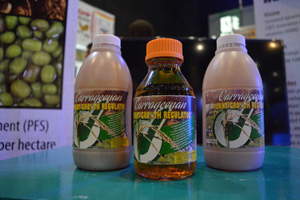 A project led by the Philippine Nuclear Research Institute of the Department of Science and Technology (DOST-PNRI) conducted confirmatory trials of carrageenan’s benefits on mungbean and peanut in Regions II, III, VII, and X.
A project led by the Philippine Nuclear Research Institute of the Department of Science and Technology (DOST-PNRI) conducted confirmatory trials of carrageenan’s benefits on mungbean and peanut in Regions II, III, VII, and X.
Titled, “Multi-location Trials of Oligo-Carrageenan for Improved Productivity of Mungbean and Peanut in Regions II, III, VII, and X,” the project conducted both on-station and on-farm trials in major mungbean- and peanut- growing areas in the country including Isabela, Cagayan, Pampanga, Bohol, and Bukidnon.
The project intended to evaluate the bio-efficacy of carrageenan on major insect pests and diseases of mungbean and peanut; assess how carrageenan affects their production time or cropping cycle; and test the stability and efficacy of carrageenan with time under storage.
Eventually, the carrageenan will be included in the recommended cultural and management practice as part of a new package of technology (POT) for mungbean and peanut farmers.
Before its completion, the project will acquire approval on its label expansion application with the Fertilizer and Pesticide Authority (FPA) – with the carrageenan as plant growth promoter (PGP) for mungbean and peanut. This will be an enabling tool to fast track the technology towards full commercialization with farmers in the four regions reaping the benefits.
 These accomplishments were discussed by the Crops Research Division (CRD) of the Philippine Council for Agriculture, Aquatic and Natural Resources Research and Development, Department of Science and Technology (DOST-PCAARRD) during a review and planning workshop on September 28, 2017 at the Department of Agriculture Region 10 - Northern Mindanao Agricultural Crops and Livestock Research Complex (DA-NMACLRC), Dalwangan, Malaybalay City, Bukidnon. The activity coincided with the “2nd National Adlay Congress and Product Exhibits” and the “24th DA-RFO X/ NMACLRC Farmer’s Field Day and Technology Forum.”
These accomplishments were discussed by the Crops Research Division (CRD) of the Philippine Council for Agriculture, Aquatic and Natural Resources Research and Development, Department of Science and Technology (DOST-PCAARRD) during a review and planning workshop on September 28, 2017 at the Department of Agriculture Region 10 - Northern Mindanao Agricultural Crops and Livestock Research Complex (DA-NMACLRC), Dalwangan, Malaybalay City, Bukidnon. The activity coincided with the “2nd National Adlay Congress and Product Exhibits” and the “24th DA-RFO X/ NMACLRC Farmer’s Field Day and Technology Forum.”
The project implementers and other cooperating agencies include the Pampanga State Agricultural University (PSAU), the Department of Agriculture – Regional Integrated Agricultural Research Centers (DA-RIARCs) in Region II (the Cagayan Valley Research Center), Region VII (Central Visayas Integrated Agricultural Research Center/ CENVIARC), and Region X (Northern Mindanao Agricultural Crops and Livestock Research Complex/ NMACLRC). The said agencies presented their accomplishments to a panel of technical evaluators of DOST-PCAARRD through their project and study leaders.
Previous multi-location trials in rice in Regions III and IV-A showed an increase of 15-40% in rice yield using a recommended rate of 9 liters of carrageenan per hectare. When applied to plants in the form of foliar sprays, it elicits various kinds of biological and physiological activities, including promotion of plant growth, seed germination, shoot elongation, root growth, flower production, suppression of heavy metals, and improvement of the plant’s immune system, making it more resistant to pests and diseases. This breakthrough in rice prompted DOST-PCAARRD to test its efficacy in other important crops like mungbean and peanut.

Results of on-farm trials implemented by the PSAU in Magalang, Pampanga showed that foliar application of carrageenan as PGP in mungbean (Var. Labo) increased crop yield by 750% compared to the farmers’ practice. On peanut (Var. NSIC Pn 14), field trials at DOST-PNRI showed a 60% yield advantage over farmers’ practice after foliar application of carrageenan. Using 100 ppm carrageenan for mungbean and peanut was established as part of the protocol.
